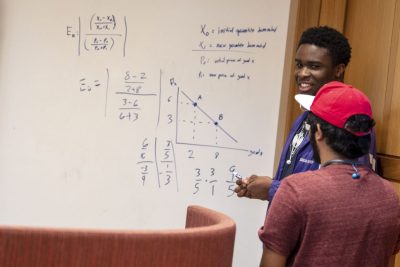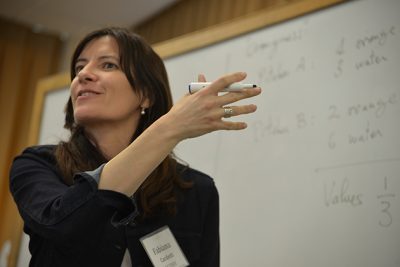
Ensuring that students receive high-quality instruction in math – a subject area that continues to face a critical shortage of teachers — has long been a concern in the realm of education.
Thanks to $1.5 million in federal funding from the National Science Foundation, plus another $250,000 in support supplied by private donors, researchers at UConn’s Neag School of Education and College of Liberal Arts and Sciences, as well as the Connecticut State Department of Education, are now forging a path to address this issue for the long term.
The Connecticut Noyce Math Teacher Leaders (MTL) Program, led by Principal Investigator and Neag School Associate Professor Megan Staples, aims to support the development and retention of exceptional math educators in Connecticut’s highest-needs school districts — while also building these districts’ future leadership capacity in math education.
For math teachers who want to grow professionally and, at the same time, continue to serve students in the classroom, Staples says, the opportunity to progress as leaders in their area of expertise is somewhat limited.
“What’s the next step? Where do they go?” Staples asks. “Many of them get their 092 [educational administration certification], but they don’t use it … So where is the professional growth and opportunity to expand and build their skill set in ways that contribute to education without leaving the classroom?”
This project seeks to help fill that void. Ultimately, the researchers hope, it will not only help to produce math teacher leaders who are well-equipped to coach their math educator colleagues, but also more equitable outcomes in math instruction for students across the state into the future.
As co-PI Jennifer Michalek, math and computer science consultant at the Connecticut State Department of Education, sees it, there will be a “trickle-down effect” for students.
As a result of the project, “students are going to have educators in front of them who have a larger capacity to meet their needs,” Michalek says. Even beyond that, she adds, “I think that educators, in general, are role models for kids. If students see collaboration among teachers, then they’ll learn to collaborate among themselves as well. There’s some modeling they’ll benefit from.”
Peer-to-Peer Support

The MTL Program is modeled on grant work previously carried out by co-PI Gladis Kersaint, UConn vice provost of strategic initiatives and Neag School dean emerita, when she was serving as faculty at the University of South Florida.
“With direct peer-to-peer support, more teachers are likely to stay and find success in the classroom,” Kersaint explains. The Floridian school district with which she had formerly partnered had its own coaching model in place, but often could still not find enough coaches in math.
“We were providing the district with a cadre of people who could be tapped to support the professional growth and development needs for their teachers,” Kersaint says. “The project provided a way for people who wanted to advance within their own field, and gave them an opportunity to see that they can contribute not only to students, but also to other math teachers.”
Empowering Teachers to Make Change
Beginning this fall, Staples and her team will recruit a diverse group of 20 math teachers in grades 6 through 12 from Connecticut’s Alliance Districts for a five-year professional learning and service program, slated to kick off in Spring 2022. It is the first grant of its kind, Kersaint says, to target Connecticut’s Alliance School Districts, which have historically experienced greater needs in terms of retaining high-quality mathematics teachers.
The five-year MTL program will focus on developing these teachers into leaders and mentors in math education. Participants will take part in coursework; a series of individualized leadership projects executed in collaboration with school or district leaders; and conference presentations. In addition, they will have the opportunity to work alongside UConn’s Center for Teaching and Learning to create online learning modules that other math teachers will be able to use going forward. A new 12-credit graduate certificate program in math education leadership is also in the works.
All of this, Staples says, will “allow [participants] to develop and exercise their leadership skills and make an impact in their own building, as well as statewide.”
Enrollees will receive an annual stipend as well. The program’s cohort model, Staples adds, is yet another benefit. “Having that network peer group can be really enriching, sustaining, and energizing,” she says.
Providing math teachers with formal leadership training as well as the infrastructure they need to share their expertise with others going forward is crucial, according to the researchers.
“Most of the work that we do at the CSDE when we work with districts is focusing on systemic change — because that really becomes lasting change,” the CSDE’s Michalek says. “If we can use the infrastructure to build leadership, which will then attract new teachers to those districts because there’s a system to naturally support them, then perhaps we won’t see turnover in those districts in math that we currently see.”
Participants in the five-year MTL program will take part in coursework; a series of individualized leadership projects executed in collaboration with school or district leaders; conference presentations; and the creation of online learning modules for other math teachers.
“I think one important thing missing at schools is the feeling that teachers can make change,” says co-PI Fabiana Cardetti, mathematics professor in the College of Liberal Arts and Sciences. “They know the content. They know their students. They know what happens in the classroom. But if they are not the principal or department head, they may feel they cannot make change beyond their classroom.”
Without feeling fully empowered to share with their colleagues best practices in equitable math instruction, and without a system in place through which they can pass along activities and practices they have found successful, Cardetti says, the field of math education is missing out – as are students.
“It feels very important to empower teachers, and to let them feel they can make change in their own classrooms – but also for their colleagues and schools, and especially so in the Alliance School Districts,” she says.
The pandemic and its effects over the past months on everything from schools to students learning remotely to society as a whole, Cardetti says, has made the need for this work all the more apparent.
“It’s not just about mathematics education; it’s bigger,” she says. “This is a prime moment to try to put all our heads together on how we change things in the future. These kids are going to be the future.”
An Extra Boost of Support
For the research team, support from two generous benefactors emerged as an added bonus. During her tenure as Neag School dean, Kersaint had introduced to the project Christopher McLeod, president of Elm Street Ventures, and his wife, UConn alumna Elaine ’78 (NUR), director of the McLeod Blue Skye Charitable Foundation.
Over the years, the McLeods have funded numerous efforts across the University, including scholarships at the School of Nursing as well as a McLeod Faculty Fellowship at the Neag School for STEM-focused initiatives. Most recently, their Faculty Fellowship Fund supported the work of Todd Campbell in the Neag School’s Department of Curriculum and Instruction.
“We have been happy with other programs we have supported at the Neag School,” the McLeods say, “such as the Teachers for a New Era, which focused on the curriculum used in high schools for non-science majors, and Dr. Campbell’s work on creating a Networked Improvement Community to support the implementation of transformative changes in STEM teaching and learning outlined in the Next Generation Science Standards.”
Based on the support the McLeods had traditionally provided in the realm of STEM with their Faculty Fellowship, Kersaint says she believed they would be quick to recognize the long-term value in “building a cadre of leaders who can support teachers in enhancing their work and delivering for the long haul in mathematics.”
“Our hope is that the Math Teaching Leader Program develops a cohort of mentors and leaders who share their teaching expertise with other math teachers in their schools and districts.”
— Christopher and Elaine McLeod
Staples is now positioned as the next McLeod Fellow, with the McLeods contributing $250,000 toward the project on top of the grant dollars the research team secured through the NSF.
“We realize that the education we received was fundamental to the success we have enjoyed in our lives,” say the McLeods. “Our philanthropic focus is on educating the next generation, with a specific emphasis on STEM. If we want our state and country to be economically competitive, we need not only trained scientists but a general population with strong skills in science and math.”
“We’ve both been blessed by having teachers who loved their subject, who inspired and challenged us,” they add. “Our hope is that the Math Teaching Leader Program develops a cohort of mentors and leaders who share their teaching expertise with other math teachers in their schools and districts.
“Hopefully, this will lead to greater satisfaction and lower turnover among math teachers, more effective teaching, and increased student engagement and learning. Ideally, the program will be so successful that there is a strong demand for future cohorts and an ongoing MTL Program. “
“We are thrilled they were there to provide that extra support that was needed for the program to run smoothly,” Cardetti says.
Applications for the MMTL program open this month, with an application deadline of Friday, Nov. 5, 2021. The team expects foundational workshops for participants to begin in Spring 2022 and coursework to launch in Summer 2022.
“It seems like there’s a real opportunity here, because how often do we get 20 expert teachers in a room together to work together for five years?” Staples says. “That’s really exciting, and that should produce some new knowledge that we haven’t been able to tap into before.”
To learn more and to apply, visit mathteacherleaders.education.uconn.edu.
 Facebook
Facebook
 Twitter
Twitter
 LinkedIn
LinkedIn
